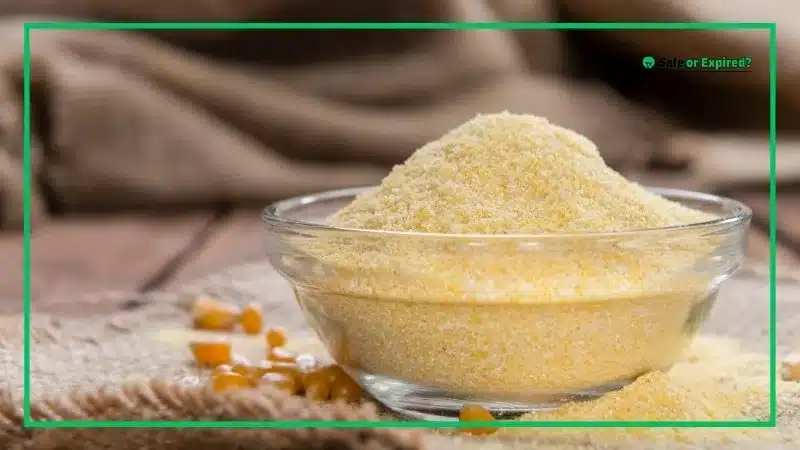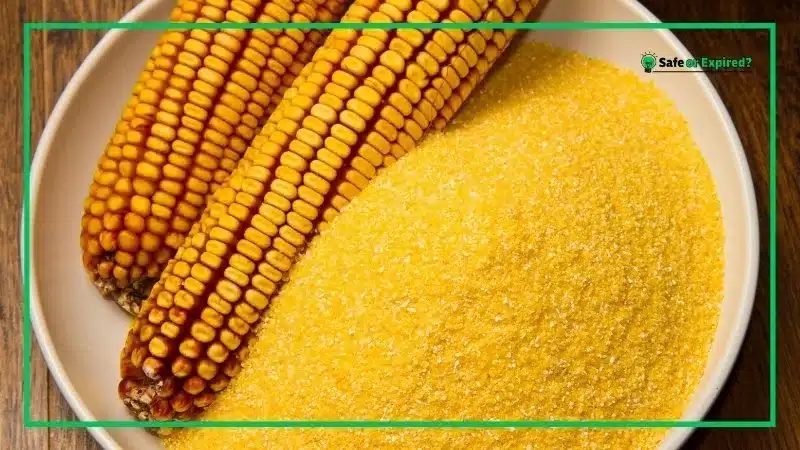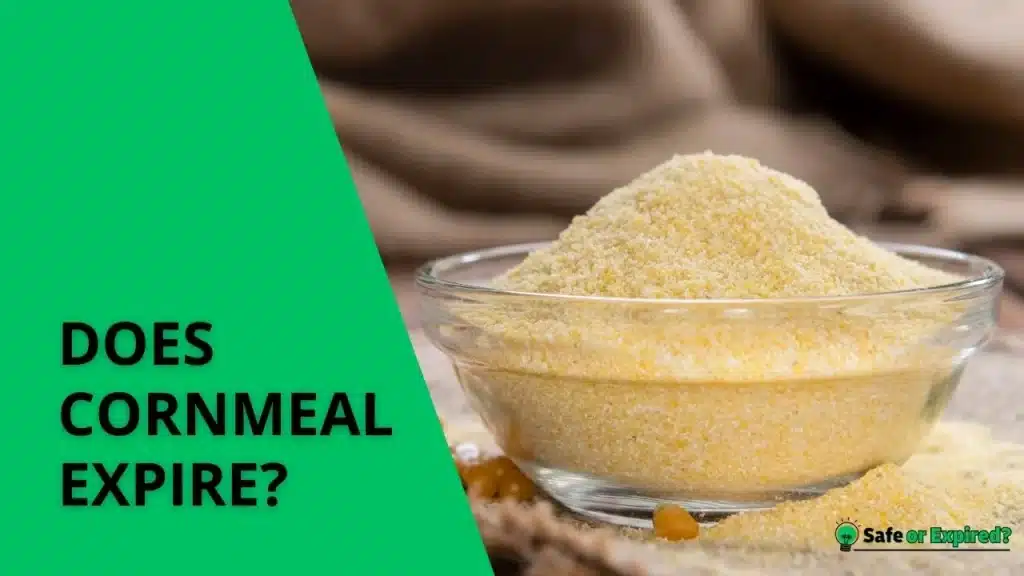“Does cornmeal expire?” is a topic that’s important for anyone who doesn’t want to waste food. Unfortunately, it does expire, and knowing when and why can save your baking day! In this guide, we’ll explore the signs of expired cornmeal and share expert tips to extend its shelf life.
Stick to the end to become a cornmeal storage wizard.
Does Cornmeal Expire? All the Details
Yes, cornmeal does expire. Over time, it can go bad due to factors such as air, moisture, and pests. To determine if cornmeal has gone bad, look for signs like an off smell, changes in texture, or the presence of mold. Proper storage in airtight containers can help extend its shelf life.
You may be wondering, “Does Cornmeal Go Bad If Unopened?” Unopened cornmeal can last longer than opened packages, but it is still susceptible to spoilage over time. The shelf life depends on the storage conditions. If kept in a dry place away from direct sunlight, unopened cornmeal can remain in good condition for a considerable period before showing signs of spoilage.
5 Factors Leading to Cornmeal Expiry
These are the five factors that affect the corneal’s shelf life:
- Moisture Exposure: Moisture/humidity can lead to the growth of mold and mildew, spoiling cornmeal.
- Air Exposure: Oxidation occurs when cornmeal is exposed to air, leading to rancidity and off-flavors.
- Temperature Fluctuations: Storing cornmeal in an environment with frequent temperature changes can accelerate spoilage.
- Pests: Insects and rodents are attracted to cornmeal and can contaminate it.
- Packaging Damage: Compromised packaging can expose cornmeal to air and pests, speeding up the degradation process.
How Long Does Cornmeal Expire?
Cornmeal typically lasts for about 12 months when stored properly in a cool, dry place. However, the actual shelf life can vary based on factors like packaging and environmental conditions. Always check for signs of spoilage such as off odors or discoloration before use.
How Long Does Cornmeal Last After Opening?
Once opened, cornmeal lasts for about 6 to 12 months if kept in an airtight container in a cool, dry environment. To maximize freshness, consider refrigerating the cornmeal, which can extend its usability by several additional months. If not, try to keep it packaged. Moreover, keep it away from sun rays.

How Long Does Cornmeal Last in the Freezer?
When stored in the freezer in an airtight, moisture-proof container, cornmeal can last indefinitely, but for best quality, use it within two years. Freezing cornmeal helps prevent rancidity and insect infestation, preserving its flavor and texture for longer periods.
Here’s the completed shelf life table for cornmeal, detailing how long it lasts on the counter, in the fridge, and in the freezer, both opened and unopened:
| Storage Location | Opened Cornmeal | Unopened Cornmeal |
| Counter | 6 to 12 months | 12 to 18 months |
| Fridge | 12 to 18 months | 18 to 24 months |
| Freezer | Up to 2 years | Indefinitely |
No matter what, it’s important that food is both delicious and safe. Learn to manage both aspects in “How to Ensure Food Quality and Safety.”
How Long Does Cornmeal Last After Expiration Date?
Cornmeal can still be used for a short period after its expiration date, typically ranging from 1 to 3 months, provided it has been stored properly. However, it’s important to inspect the cornmeal carefully for any odors, changes in texture, or signs of mold before using it.
If any of these signs are present, the cornmeal should be discarded to avoid health risks. Proper storage practices can help extend its usability even beyond the expiration date.
What Happens if You Eat Expired Cornmeal?
Eating expired cornmeal can be risky if it shows spoilage signs, such as mold or an off smell. It may cause foodborne illnesses with symptoms like stomach upset, nausea, and diarrhea. However, if the cornmeal appears fine, it might be safe to eat but could have reduced flavor and nutritional value.
Possible Digestive Distress
When you eat expired cornmeal that has gone bad, your stomach might not be very happy about it. This is because old cornmeal can grow mold or bacteria that your body doesn’t like. If you eat it, you might start feeling queasy, get stomach aches, or even throw up.
This happens because your stomach is trying to get rid of the bad stuff you ate. Also, you might experience diarrhea, which is your body’s way of flushing out the toxins quickly. It’s important to check your cornmeal for any strange smells or colors before you use it to avoid feeling sick.
Allergic Reactions to Mold
Mold can grow on cornmeal that’s not stored properly, especially if it’s old. Some people are really sensitive to mold, and if they eat moldy cornmeal, they can start sneezing, coughing, or even get itchy skin. This is your body’s way of fighting off the mold particles it thinks are invaders.
Mold allergies are pretty common, and they can make you feel pretty miserable, just like having a cold or hay fever. So, it’s a good idea to make sure your cornmeal is stored in a dry, cool place and is used before it gets too old.
No Symptoms with Good Cornmeal
If your expired cornmeal doesn’t have any mold, weird smells, or strange looks, it might still be okay to eat. In this case, you probably won’t feel sick after eating it. However, the cornmeal might not taste as good as it used to, and some of the healthy stuff like vitamins might not be as strong anymore.
Foods can lose their freshness and flavor over time, even if they don’t make you sick. So, while it might not be as tasty or nutritious, using slightly outdated cornmeal without any signs of spoilage usually isn’t dangerous.
By being cautious and checking your cornmeal before using it, you can avoid unpleasant symptoms and ensure your meals are both safe and tasty.
To prevent food from spoiling, it’s essential to understand the underlying causes. Get informed with “Identifying Causes of Food Spoilage.”
How To Tell if Cornmeal Is Bad? Look for These Signs
To determine if cornmeal is bad, look for signs like a musty or sour smell, a change in color to yellowish or gray, the presence of mold, or a clumpy texture. These indicators suggest that the cornmeal has spoiled and should not be used.
Musty or Sour Smell
Cornmeal should have a sweet, slightly earthy smell. If your cornmeal starts to smell musty, sour, or just plain strange, it’s a strong sign that it’s no longer good to use. This change in smell is caused by the growth of bacteria or mold, which can happen if it’s exposed to moisture or stored for too long.
It’s important to trust your nose — if something smells off, it’s better to be safe and throw it out. Using smelly cornmeal can ruin your recipes and might make you sick.
Change in Color
Fresh cornmeal typically has a light, golden color. If you notice that your cornmeal has turned a darker yellow, brown, or even gray, it’s a sign that it might have gone bad. This color change can be due to oxidation, which happens when cornmeal is exposed to air for too long.
Oxidation can affect the flavor and safety of the cornmeal, making it unsuitable for cooking or baking. Always check the color closely before using cornmeal, especially if it has been stored for a while.
This is what the color should be.

Presence of Mold
Mold on cornmeal usually appears as green or black spots. Mold growth can occur if the cornmeal is stored in a damp place or if it’s been kept beyond its shelf life. Eating moldy cornmeal can be harmful as mold produces toxins that are dangerous to our health.
If you see any signs of mold, do not use the cornmeal. It’s not safe to just remove the moldy part and use the rest, as the spores can spread through the entire container.
Clumpy Texture
Cornmeal is naturally loose and granular. If you find that your cornmeal has become clumpy or feels sticky when you touch it, moisture has likely gotten into the packaging. This moisture can lead to mold and bacterial growth. Clumps in your cornmeal mean that it has absorbed moisture, and it’s probably not safe to use anymore.
Always keep cornmeal in a tightly sealed container to avoid moisture and keep it fresh longer.
By knowing these signs, you can easily tell if your cornmeal has gone bad. Moreover, following safety guidelines is crucial for keeping your food safe. Read about the recommendations from leading safety organizations in “Food Safety Guidelines from Trusted Authorities.”
Does Corn Meal Mix Expire? Find Out
Yes, the cornmeal mix does expire. Like pure cornmeal, cornmeal mix contains ingredients that can degrade over time. It usually happens if the mix is exposed to air, moisture, or heat. The shelf life of cornmeal mix typically depends on the additional ingredients used in the mix, such as leavening agents or fats, which may shorten its lifespan compared to plain cornmeal.
It’s important to check the expiration date provided by the manufacturer and store the cornmeal mix in a cool place to help preserve its quality. If the mix shows signs of spoilage, like an off smell, discoloration, or visible mold, it should be discarded.
4 Best Ways to Extend Cornmeal Shelf Life
To extend the shelf life of cornmeal, store it in an airtight container in a cool or dry location. Consider refrigerating or freezing it for long-term storage, and always keep it away from direct sunlight and moisture to prevent spoilage.
Store in an Airtight Container
Keeping cornmeal in an airtight container is crucial to protect it from air and moisture. Air exposure can cause the oils in cornmeal to become rancid, while moisture can promote mold growth.
Use containers with tight seals, such as glass jars, or heavy-duty plastic containers with snap-on lids. This method not only keeps out moisture and air but also protects the cornmeal from pests like insects and rodents that might be tempted by its scent.
Keep in a Cool, Dry Place
The storage environment greatly affects the shelf life of cornmeal. Heat and humidity are enemies of many pantry staples, including cornmeal. Store it in a dry area of your kitchen or pantry, away from any heat sources like stoves or sunlight that comes through windows. Areas that maintain a consistent temperature are ideal.
This prevents the cornmeal from getting warm and moist. Such conditions can lead to the growth of mold and bacteria, making it spoil faster.
Don’t let common misconceptions steer you wrong. Clarify what’s true and what’s not in “Correcting Common Food Preservation Myths.”
Refrigerate or Freeze for Longevity
For long-term storage, refrigerating or freezing cornmeal can significantly extend its shelf life. In the refrigerator, cornmeal can stay fresh for a year or more, and in the freezer, it can last indefinitely. When storing cornmeal in the refrigerator or freezer, make sure it is in a well-sealed container or a freezer bag to prevent moisture from getting in and to avoid absorbing odors from other foods.
This method is particularly useful if you don’t use cornmeal frequently and want to keep it fresh for occasional use.
Avoid Sunlight At All Cost
Sunlight can raise the temperature of your storage area, which may cause the cornmeal to spoil quickly. Therefore, store cornmeal in a cabinet or a pantry that does not receive direct sunlight. This protects the cornmeal from the potential heat damage that sunlight can cause, thus keeping it fresh for a longer period.
By following these storage tips, you can help ensure that your cornmeal remains fresh, tasty, and safe to use, extending its shelf life effectively.
Conclusion
Cornmeal does expire, and understanding the factors that influence it is essential for any kitchen. Here’s a quick recap of what you’ve learned:
- Proper Storage: Store cornmeal in an airtight container to protect it from moisture and pests.
- Ideal Conditions: Keep it in a cool place away from direct sunlight to prevent spoilage.
- Check Regularly: Look for spoilage like mold and off smells before use.
- Freezing Extends Life: Consider freezing cornmeal for long-term preservation.
- Use by Date: Pay attention to the expiration date but assess the quality before discarding.
By following these guidelines, you can ensure that your cornmeal remains a reliable ingredient in your cooking and baking adventures.

